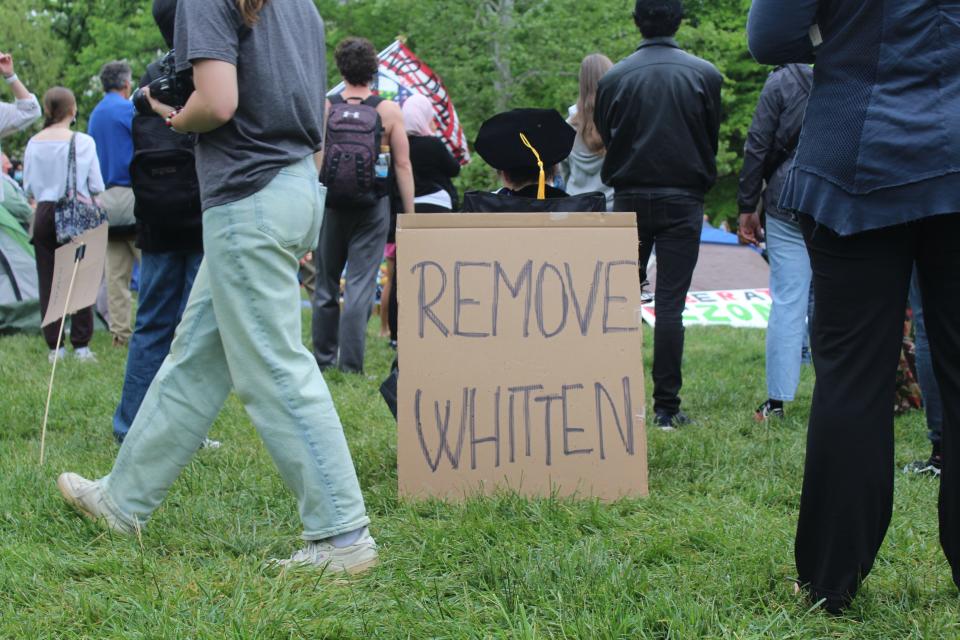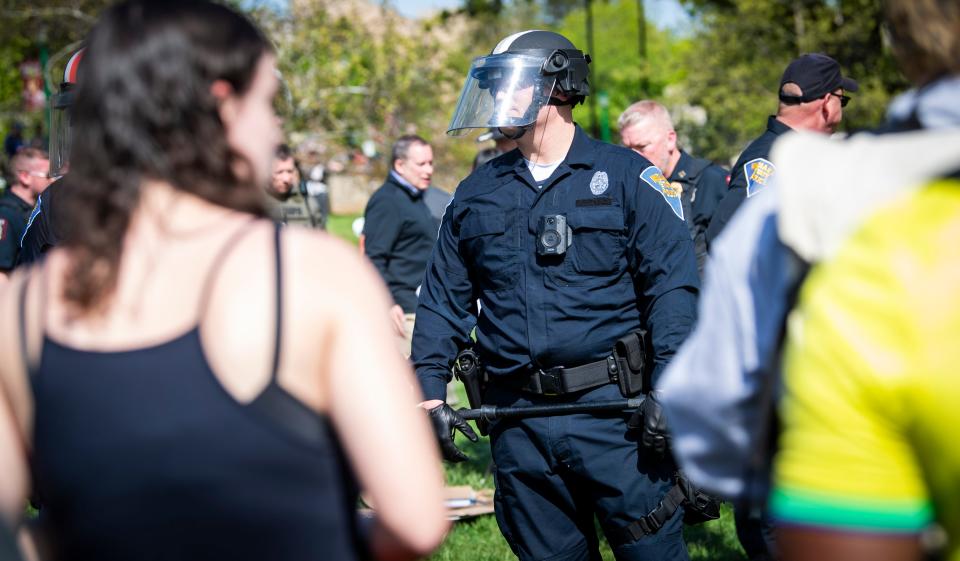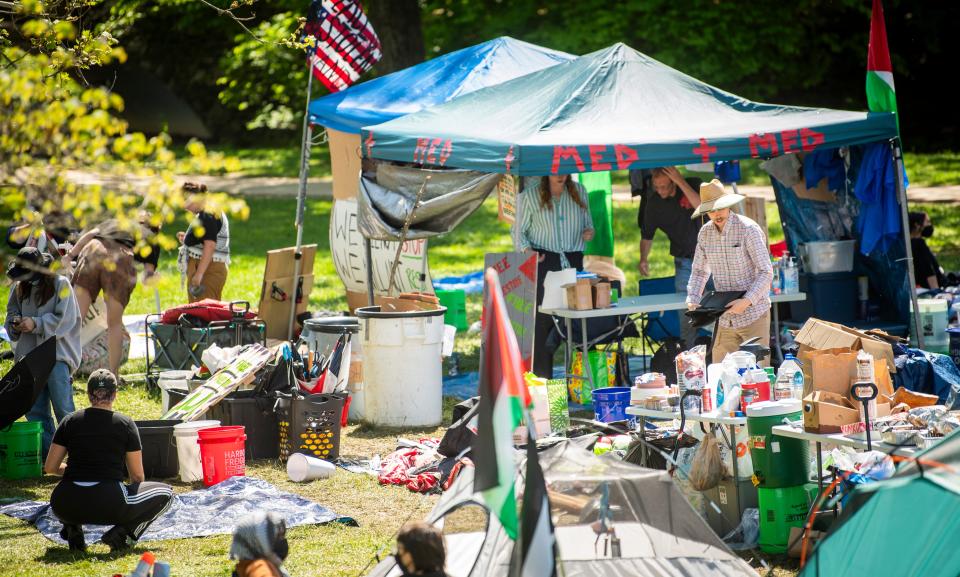ACLU sues Indiana University, alleging First Amendment violations against demonstrators
The American Civil Liberties Union (ACLU) of Indiana announced Friday it is suing Indiana University for violating the First Amendment rights of three demonstrators who were arrested and given no-trespass orders on April 25 at the pro-Palestinian encampment in Dunn Meadow.
The lawsuit was filed with the U.S. District Court for the Southern District of Indiana and involves three plaintiffs: Ben Robinson, a professor of Germanic Studies at IU, Madeline Meldrum, a graduate student, and Jasper Wirtshafter, a Bloomington resident and membership coordinator for Bloomington Cooperative Living. The listed defendants are the IU Board of Trustees and IU President Pamela Whitten.

All three plaintiffs were detained by Indiana State Police troopers on April 25 and given one-year bans from Dunn Meadow. The arrests, which occurred on the first day of an ongoing pro-Palestinian encampment on Dunn Meadow, came after IU changed its policy on the use of “structures” like tents and signs in outdoor spaces on the eve of the protest – a move that critics have argued was targeted and led to police escalation.
ISP chief defends actions at IU: ISP chief pushes back against criticism police response on IU campus was 'heavy-handed'

Both Robinson and Meldrum’s bans have been temporarily stayed by IU as they begin the appeals process.
Lawsuit alleges unlawful ‘prior restraint’ against protesters
The ACLU lawsuit alleges that IU violated the plaintiffs’ First Amendment rights by imposing one-year no-trespass bans, thus barring them from returning to Dunn Meadow to participate in the protest. Indiana University is a public entity and Dunn Meadow is regarded as a “public forum,” meaning restrictions on the plaintiffs’ access could violate their constitutional rights.
Ken Falk, legal director for the ACLU of Indiana, said the lawsuit primarily concerns “prior restraint,” a legal doctrine concerning preemptive censorship of speech by the government or a state-owned entity.
“What has happened here is that IU, for whatever reason, has chosen to say, ‘Because you were arrested and allegedly did X, Y or Z, you lose your right to engage in First Amendment expression,’” Falk said. “And that’s simply something that we believe cannot be allowed.”
Prior restraint cases most often concern preemptive censorship in the press, such as the 1971 Supreme Court case New York Times Company v. United States, in which the Nixon administration attempted to bar the New York Times and Washington Post from publishing the leaked “Pentagon Papers” by arguing it would endanger national security and hurt the war effort in Vietnam. The Supreme Court ruled in the papers’ favor.
Falk noted that prior restraint has also been used in Supreme Court cases concerning public gatherings. In the 1977 Supreme Court case National Socialist Party of America (NSPA) v. Village of Skokie, the court ruled that the City of Chicago violated the constitutional rights of the NSPA (a neo-Nazi group) by denying them permits to gather in a park. The Supreme Court, which guides jurisprudence for all U.S. courts, has generally ruled that government and state-owned entities must prove “a direct and immediate danger” to justify prior restraint.
While the filed complaint mentions IU changing the policy on the eve of the protest, Falk said the lawsuit focuses on the alleged constitutional violations of the plaintiffs being banned from Dunn Meadow following their arrests.
“We are not challenging the change in policy. The change in policy did not say anything about not making Dunn Meadow a public forum,” Falk said. “What we have here is a prior restraint. And that simply is something that the courts and the First Amendment does not tolerate.”
An IU spokesperson declined to comment, saying IU does not comment on pending litigation.
Plaintiffs say appeals process has been confusing, untransparent
Meldrum, one of the lawsuit’s plaintiffs whose ban was temporarily stayed on Friday, said during a press conference that her appeals process thus far had been difficult and confusing.
“When we initially received the trespass ban, all that was written on it was that we could appeal by contacting the [Indiana University Police Department],” Meldrum said. “They didn’t give us an email or phone number on that, we had to just kind of figure it out.”Meldrum said she was told multiple different numbers and offices to call to begin the appeals process, and said she heard “by word of mouth” that all of those charged would have only five days to begin their appeal. In total, Meldrum said she sent three voicemails and six emails to various departments.
Meldrum said she was notified by the ACLU that her ban had been stayed on Friday morning, and said to date, she hasn’t received direct communication from the university about her status.
“The IUPD and administration really didn’t update me at all about the status of my ban and whether my appeal had been received, whether I was going to be actually banned for a whole year, any of that,” Meldrum said. “And that is not a pleasant thing to have hanging over my head.”
Robinson said his appeals process was also “opaque,” with him contacting both the Office of Student Life and the Deputy Chief of the IUPD before receiving an update about his ban through the ACLU.
“It was unclear how to respond to get this stay,” Robinson said. “And my understanding is that the appeals would go directly to the president, and as someone who's been very involved with doing the process on campus, it’s completely opaque to me what’s going to happen. And obviously, that’s a source of anxiety for me.”
IUPD public information officer Hannah Skibba said, “IUPD is managing the appeals process and is coordinating with appropriate university partners to respond to each individual request.”

Both Robinson and Meldrum’s bans have only been temporarily stayed. The two say they’ve since returned to the encampment at Dunn Meadow and plan to continue to be involved.
“As soon as I heard, I drove over, and it happened to be past midnight,” Robinson said. “Being there, being able to go back, was incredibly important.”
Reach Brian Rosenzweig at brian@heraldt.com. Follow him on X/Twitter at @brianwritesnews.
This article originally appeared on The Herald-Times: ACLU sues Indiana Unviersity for prior restraint of pro-Palestine protestors

